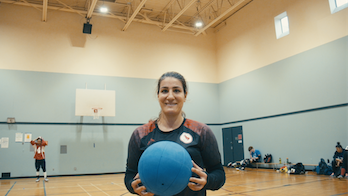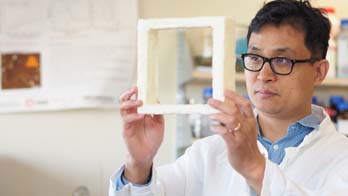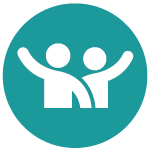Felicia Voss-Shafiq is a starter on the Canadian women’s sitting volleyball team. She helps others who are facing the prospect of amputation and encourages those who want to learn more about adaptive sports.
#ImmigrationMatters in Burnaby, British Columbia - Making Canada proud—and delivering support to fellow amputees
Making Canada proud—and delivering support to fellow amputees
April 9, 2024
Share:

A Paralympian and starting attacker on the Canada women’s sitting volleyball team, Felicia Voss-Shafiq didn’t grow up playing sports. Born and raised in Fiji, she says her culture and family emphasized academics and careers.
Now, Felicia is keen to coach or teach anyone who wants to learn about sitting volleyball, and has done so with kids with disabilities. She also makes time for the Amputee Coalition of Canada Peer Visitor Program, which connects experienced amputees to others who are facing amputation.
“These can be challenging conversations,” she says. “But you really want to help them find some hope.”
Sheena King, a regional representative for the program and a physiotherapist at G.F. Strong Rehabilitation Centre in Vancouver, recalls Felicia connecting with a man in his twenties who had experienced amputation after trauma and was feeling despair about his future.
“He didn’t believe he would ever get back to doing sports or other favourite activities,” says Sheena. “But Felicia really encouraged him.”
Her first foray into volleyball wasn’t until the age of 25, after friends encouraged her to try it. By that time, she was living in the Vancouver area and working in product support for a software company. She fell in love with the sport instantly, and competed regularly for the next six years.
“As a human and as a player, Felicia is one of the most determined and resilient people I've ever met. She owns her role, she shows up and does it every single day with a smile, and she makes those around her better.”
Nicole Ban, head coach, Canadian women’s sitting volleyball team
One day on the morning of a tournament, Felicia woke up feeling sick. She worsened quickly and was rushed to hospital, where she was diagnosed with pneumococcal pneumonia. Blood poisoning set in, sending her into septic shock and a coma. Although her doctors were hopeful for a full recovery, ultimately, the difficult decision was made to amputate both legs below the knee.
“I was devastated,” says Felicia. “Volleyball had given me so much joy. I couldn’t even go past parks where I had once played without feeling emotional.”
Rehabilitation took more than three years. A physiotherapist urged her to try sitting volleyball, but Felicia wasn’t interested—that was until a friend mentioned that he could picture her on a podium receiving a medal for the sport. The next time the national women’s team was in BC, she decided to reach out and give it a try—and fell in love again.
“Not only was the sport challenging, but the women were incredible. And everyone more or less looked like me,” she says.
Not long after Felicia joined the team in 2015, the team qualified for the 2016 Paralympic Games in Rio de Janeiro. More recently, it qualified for the Tokyo Paralympic Games, coming in fourth, and won silver at both the 2022 World Championships and the 2023 World Cup.
Head coach Nicole Ban says there was something special about Felicia right from the start, and that she has seen her “blossom into this strong, confident person who paves the way for other double amputees.”
A role model, supportive mentor and coach, dedicated teammate, and formidable adversary on the court—Felicia is all these things and more. Look out, Paris 2024.
Immigration profile: Burnaby, British Columbia
Quick facts:
- In the 2021 census, Burnaby was home to the fourth-largest immigrant population in Greater Vancouver, a tally of 123,795, representing 11.4% of the region’s immigrant population.
- A total of 50.4% of Burnaby’s population are immigrants.
Did you know?
- Involvement in sport is just way to participate in Canadian society, and represents a key wellbeing indicator in the Quality of Life Framework for Canada.
- There are more than 2,800 immigrants working as athletes, coaches, officials and referees across the country.
You may also be interested in ...
 Inspiring the next generation of athletes
Inspiring the next generation of athletes
Knowing her true potential as a Paralympic athlete, Maryam came to Canada determined to wear the maple leaf and inspire younger athletes.
 Bringing joy and belonging to queer communities
Bringing joy and belonging to queer communities
In the 5 short years since Tabitha McIntyre came to Canada from Scotland, they have tirelessly volunteered with Pride organizations to advocate and build a community for 2SLGBTQI+ people.
 Partnering with an Indigenous community to fight plastic pollution
Partnering with an Indigenous community to fight plastic pollution
Dr. Feng Jiang, a University of British Columbia professor originally from China, is on a mission to replace plastics with biodegradable materials—and his work with the Wet’suwet’en First Nation could help build economic prosperity for First Nations in the province.

Page details
- Date modified:




